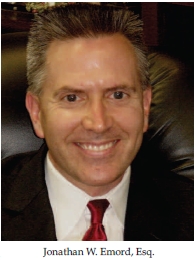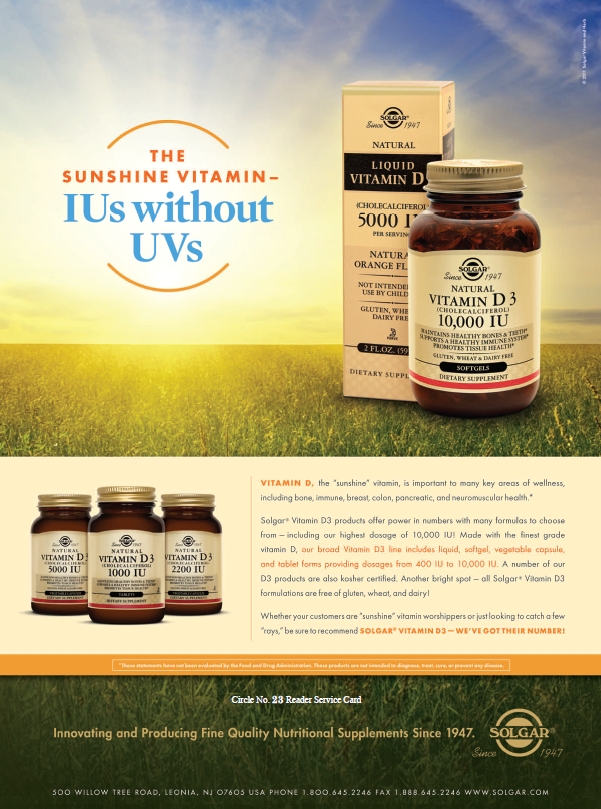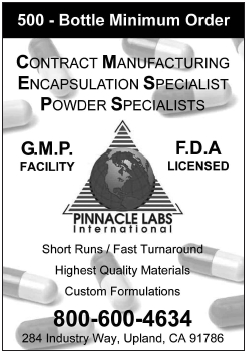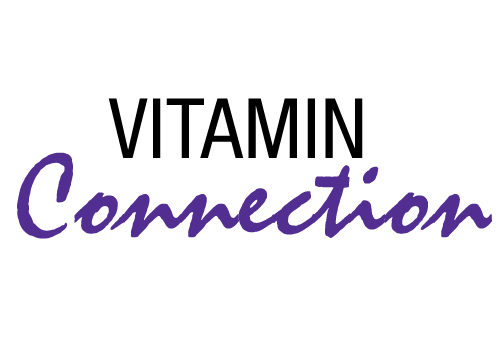Will recent events cut the number of dietary supplements available in half and increase the cost of those that remain? Do we need to take action again? A couple of recent events remind me of a discussion we had with Constitutional Attorney Jonathan W. Emord, Esq., in October 2003 about action being required to protect everyone’s health. We called upon the wisdom of Thomas Jefferson and others. Jefferson pointed out, “Eternal vigilance is the price of freedom.” Irish politician John Philpot Curran, who in speaking on the Right of Election in 1790 purportedly said, “It is the common fate of the indolent to see their rights become a prey to the active. The condition upon which God hath given liberty to man is eternal vigilance; which condition if he break, servitude is at once the consequence of his crime and the punishment of his guilt.” We must keep our guard up and take action to defend ourselves when needed and not too late.
We need to be able to distinguish real threats from simple misguided, misinformed criticisms. However, the task is not always easy as often the threats are disguised, like the proverbial wolf-in-sheep’s-clothing, as efforts to help us or the public. Recently, two rapid-fire events have raised questions. Some have interpreted the actions as being potentially disastrous, while others see them as just misguided efforts that can be corrected before serious damage occurs. So, once again, I am calling upon Jonathan Emord of Emord and Associates to enlighten us from the legal point of view. Many readers are familiar with Attorney Emord, as he has chatted with us in this column about important industry legal issues many times previously. Most recently, we discussed his victory over the U.S. Food and Drug Administration (FDA) regarding selenium qualified health claims.
Attorney Emord has been practicing constitutional and administrative law before the federal courts and  agencies since 1985. Having begun his career as an attorney in the Federal Communications Commission during the administration of President Ronald Reagan, Attorney Emord has maintained an abiding conviction to achieve full First Amendment protection for the freedoms of speech and press. In 1991, he authored the critically acclaimed Freedom, Technology, and the First Amendment, in which he chronicled the intellectual foundations of the First Amendment and advocated replacing government control over the airwaves with a title registry, private property rights approach. In 2008, he authored the Amazon.com best seller, The Rise of Tyranny, and in 2010, he authored a second Amazon.com best seller, Global Censorship of Health Information. Attorney Emord has practiced law for several well-respected firms, including Wiley, Rein & Fielding, and served as vice president of the Cato Institute.
agencies since 1985. Having begun his career as an attorney in the Federal Communications Commission during the administration of President Ronald Reagan, Attorney Emord has maintained an abiding conviction to achieve full First Amendment protection for the freedoms of speech and press. In 1991, he authored the critically acclaimed Freedom, Technology, and the First Amendment, in which he chronicled the intellectual foundations of the First Amendment and advocated replacing government control over the airwaves with a title registry, private property rights approach. In 2008, he authored the Amazon.com best seller, The Rise of Tyranny, and in 2010, he authored a second Amazon.com best seller, Global Censorship of Health Information. Attorney Emord has practiced law for several well-respected firms, including Wiley, Rein & Fielding, and served as vice president of the Cato Institute.
Attorney Emord practices food and drug law, deceptive advertising law and libel law, and he served as lead counsel in the Pearson v. Shalala (D.C. Cir. 1999); Pearson v. Shalala (D.C.D.C. 2001); Pearson v. Thompson (D.C.D.C. 2001); Whitaker v. Thompson (D.C.D.C. 2002); and ANH v. Sebelius (D.C.D.C. 2010) cases, holding FDA censorship of nutrient-disease relationship claims unconstitutional. He also served as lead counsel in Nutraceutical Corp. v. Crawford (D.Ut. 2005). Attorney Emord is admitted to practice in the states of Illinois, Virginia and the District of Columbia. He is admitted to practice before the U.S. Supreme Court; the U.S. Courts of Appeal for the D.C., Fourth, Seventh, Ninth, and Tenth Circuits; the U.S. Court of International Trade; and the U.S. District Courts for the District of Columbia, Eastern District of Virginia, Northern District of Illinois, and Western District of Wisconsin. He is a member of the Governing Council of the International Society of Regulatory Toxicology and Pharmacology. He is the only non-scientist member and vice chair of the Certification Board for Nutrition Specialists. He is a 1982 graduate (B.A., Political Science and History) of the University of Illinois, where he was an Edmund J. James Scholar and a 1985 graduate (J.D.) of DePaul University.
Attorney Emord’s professional publications include Freedom, Technology, and the First Amendment (1991), “The First Amendment Invalidity of FCC Ownership Regulations” (Catholic University Law Review, 1989), “Contrived Distinctions: The Doctrine of Commercial Speech in First Amendment Jurisprudence” (Cato Institute Policy Analysis, 1991), “The First Amendment Invalidity of FCC Content Regulations” (Notre Dame Journal of Law, Ethics & Public Policy, 1992), “Murder by Medicare: The Demise of Solo and Small Group Medical Practices” (Regulation, 1998), and “Pearson v. Shalala: The Beginning of the End for FDA Speech Suppression” (Journal of Public Policy & Marketing, 2000).

Passwater: Many of our readers have come to know how you defend the U.S. Constitution and how you have brilliantly fought for our rights in various federal courts. In doing so, you have on several occasions won court decisions that mandated that the FDA obey the U.S. Constitution and stop their illegal activities aimed at the dietary supplement industry.
The reason that I bring this up, is that I feel that the dietary supplement industry may have recently been given a one-two punch in what some observers feel could be a knockout attempt. I use this analogy because we both have had experience with the sport of boxing. It seems that boxing taught both of us to stand up for our principles.
Your adversaries are well aware of your legal brilliance, but perhaps they are unaware of your “never-give-up” determination that you learned in the ring and that gives you the drive to fight for the Constitution of the USA. Did you inherit this “defender” trait from your father who was a professional fighter?
Emord: I endeavor to live up to my father’s great example and often reflect on his wise counsel. He was a greater man than I could ever be. A professional boxer who fought under the pseudonym Tommy Reardon between 1942 and 1947, he had 61 professional fights, including 57 wins (the majority by knock-out), three losses and one draw. He was a perfect gentleman (who placed my mother on a pedestal), entirely unafraid (the bravest man I ever knew), honest to the core, and an extremely loving and protective father and husband. He served 33 years in the United States military around the globe. Throughout my youth and adulthood, I have admired his great love of country more than self, his commitment to principle, and his high ethical standards of personal and professional conduct. He will forever be a giant in my eyes. I miss him dearly.
Passwater: Well, you have indeed inherited his traits and exemplify his principles. You certainly have defended us well. You recently defended us against the FDA’s attempts to do away with qualified health claims. In the case with selenium reducing the risk of several forms of cancer, you actually reached an agreement that expanded the qualified health claims. Has the FDA published the new qualified health claims yet?
Emord: They have not, but the agreement reached with the agency stands and any party wishing to use the claims allowed for selenium supplements may do so. If history is our guide, we can count on FDA to continue its censorship of nutrient-disease information in contumacious disregard of the constitutional precedent.
Passwater: You are also involved in a similar effort with antioxidant qualified health claims. How is that court action progressing?
Emord: The United States District Court for the District of Columbia ruled that FDA had to revise the draconian qualified qualifications that accompanied the antioxidant/cancer risk reduction claims the agency allowed. That decision relied on the earlier one for selenium in reaffirming that FDA violates the First Amendment when it requires negative, value-laden qualifications that defeat the meaning of a claim and must, instead, rely on succinct and accurate qualifications.
Passwater: Both of these efforts are to help inform the public about the role of nutrients in health. There are many studies that show dietary supplements improve health, save lives and reduce health care costs. The cost reductions in today’s dollars would exceed $100 billion. An example of one such study is that of Dr. Jeff Blumberg who in 1997 reported that “improving nutritional practices could potentially delay the onset of cardiovascular disease, stroke and osteoporosis by five years, thus saving $89 billion in health care costs annually” (1). Another example is the Lewin Study that reported that just pennies a day on supplements per person can reduce our national health care expenditures by $24 billion over five years (2). Both studies were published before it was determined that higher levels of vitamin D could provide even larger cost reduction. Such impact on our national health care costs is not surprising, since about 92% of Americans do not receive the RDI for one or more nutrients. As we go to press, a new study has been released in the European Journal of Nutrition that shows that antioxidant nutrient supplementation reduced cancer mortality by 48% and all-cause mortality was reduced by 42% over the 11 years of study (3).
Yet, in spite of the proven health contributions of the dietary supplement industry, many feel that there are organized and persistent efforts to destroy this industry. Are these latest efforts significant threats to the industry or are they just minor misguided attempts to strengthen the industry?
Emord: They are not just threats; actions are now underway that will cause many dietary supplement companies that make safe and valuable products to disappear from the market. FDA regulation under the guise of safety poses the greatest threat to the survival of the dietary supplement industry. The  current good manufacturing practice guidelines (cGMPs) regulate every aspect of dietary supplement production, focusing on dictating the kind of processes, record-keeping, and handling procedures a dietary supplement company must observe. Under the GMPs, a record-keeping error that in no way results in the production of a product harmful to consumers is nevertheless deemed an act of adulteration. Rather than hold the industry responsible for finished products, demanding that producers possess proof that finished products do not pose a significant risk of injury, FDA, at the urging of the NNFA (now the NPA), adopted process controls that are very costly, anti-competitive barriers. FDA admitted in the GMP rule that upwards of 25% of the industry would succumb to FDA’s GMP enforcement efforts.
current good manufacturing practice guidelines (cGMPs) regulate every aspect of dietary supplement production, focusing on dictating the kind of processes, record-keeping, and handling procedures a dietary supplement company must observe. Under the GMPs, a record-keeping error that in no way results in the production of a product harmful to consumers is nevertheless deemed an act of adulteration. Rather than hold the industry responsible for finished products, demanding that producers possess proof that finished products do not pose a significant risk of injury, FDA, at the urging of the NNFA (now the NPA), adopted process controls that are very costly, anti-competitive barriers. FDA admitted in the GMP rule that upwards of 25% of the industry would succumb to FDA’s GMP enforcement efforts.
The Food Safety Modernization Act is also misguided. Under it, FDA will hire between 4,000 and 6,000 new inspectors every year from now through 2016. In addition, the agency is required to inspect all food facilities and, if any violation (regardless of how technical) is found, reinspections may occur at the owner’s expense. FDA anticipates raising $100 million from these fees in 2011 and more in each subsequent year. By statute, all of the fees must be dedicated to inspections, thus creating a perverse incentive for inspectors to reinspect. This new law will greatly add to costs on the industry, reducing the number of players, reducing the number of products available to consumers, and increasing the costs of remaining products. It will likely do nothing to increase the relative level of safety in the market, which, for supplements, is already very high.
The FDA’s New Dietary Ingredient guidance is yet another, extremely onerous regulation. Under it, FDA is redefining the term “new dietary ingredient.” Any dietary ingredient deemed a new dietary ingredient is unlawful to sell without proof that it is an ingredient in the food supply that has not been chemically altered or without FDA allowance of the marketing of the NDI following submission of an NDI petition to the agency. FDA explains that it considers almost every form of chemical extraction of a nutrient from plants, use of ripened instead of unripened fruit when the latter was previously used, and use of nanotechnology in the development of supplements as among those things that will cause it to regard a dietary ingredient as “chemically altered.” In addition, FDA has stated that a dietary ingredient in foods, but not in supplements, marketed before the date the Dietary Supplement Health and Education Act (DSHEA) was signed into law (October 15, 1994) is a new dietary ingredient.
On behalf of the Alliance for Natural Health, we hired Joanna Shepherd Bailey, Ph.D., professor of law and economics at Emory University, who is an expert in evaluating the cost of regulation. She assessed the likely effects of the NDI Guidance on the industry. Dr. Bailey determined that full implementation of the Guidance would cause approximately half of all dietary supplements now on the market to be unlawful to sell (deemed adulterated because they contained ingredients the FDA would consider “new dietary ingredients”). She also determined that full implementation of the Guidance would result in the loss of some 100,000 jobs and tens of billions in industry revenues. Dr. Bailey expects the guidance will have a major adverse effect on the American economy, already in a recession that no one expects to end anytime soon.
and economics at Emory University, who is an expert in evaluating the cost of regulation. She assessed the likely effects of the NDI Guidance on the industry. Dr. Bailey determined that full implementation of the Guidance would cause approximately half of all dietary supplements now on the market to be unlawful to sell (deemed adulterated because they contained ingredients the FDA would consider “new dietary ingredients”). She also determined that full implementation of the Guidance would result in the loss of some 100,000 jobs and tens of billions in industry revenues. Dr. Bailey expects the guidance will have a major adverse effect on the American economy, already in a recession that no one expects to end anytime soon.
Passwater: Many are concerned about the FDA’s new interpretation of the 1994 DSHEA provisions for new dietary ingredients. Should we be concerned?
Emord: For the reasons previously stated, we should very much be concerned. Every effort should be undertaken to cause the guidance to be withdrawn. It threatens to destroy many jobs, cause many supplements to be removed from the market and force the closure of many supplement companies. FDA has misconstrued the plain and intended meaning of the DSHEA New Dietary Ingredient provision in a way that produces the arbitrary and capricious result of causing entirely safe ingredients derived from food sources to be deemed unlawful to sell in supplements. That was never Congress’s intent, and it causes a provision that was intended to protect safety to be one that deprives consumers of choice in the market without proof of any harm to public safety.
Passwater: The FDA is now implementing the Food Safety Modernization Act. Is there anything else in that bill beyond reinspection fees and greater government inspections that concern you?
Emord: Yes. The law forces almost every food establishment to be registered with the federal government for the first time in American history. In addition, it mandates that only registered food producers may lawfully manufacture, hold, distribute or sell foods. It gives the FDA Commissioner the right to revoke registrations summarily, before a  trial on the merits, based on a suspicion that the company is selling an adulterated product. It thus removes the presumption of innocence and places the industry under the arbitrary will of whoever sits as FDA Commissioner. The law replaces a food producer’s right to an Article III court of law with FDA administrative courts. That approach violates the separation of powers doctrine by depriving supplement companies of an opportunity to have an independent and unbiased trial on the merits of their cause. The change forces a food company whose registration has been suspended or revoked to be tried before the very agency that accuses the company of wrongdoing. Having practiced administrative law for many years, I know administrative courts to be biased in favor of the agencies that pay the Administrative Law Judges’ (ALJ) salaries. Indeed, in the end the Commissioner would be appealed to from an adverse ALJ decision, and the Commissioner is the person who revoked or suspected the registration at the outset, a biased party that then serves as prosecutor and judge. That move is an evil one, calculated to tip the scales in favor of the accuser.
trial on the merits, based on a suspicion that the company is selling an adulterated product. It thus removes the presumption of innocence and places the industry under the arbitrary will of whoever sits as FDA Commissioner. The law replaces a food producer’s right to an Article III court of law with FDA administrative courts. That approach violates the separation of powers doctrine by depriving supplement companies of an opportunity to have an independent and unbiased trial on the merits of their cause. The change forces a food company whose registration has been suspended or revoked to be tried before the very agency that accuses the company of wrongdoing. Having practiced administrative law for many years, I know administrative courts to be biased in favor of the agencies that pay the Administrative Law Judges’ (ALJ) salaries. Indeed, in the end the Commissioner would be appealed to from an adverse ALJ decision, and the Commissioner is the person who revoked or suspected the registration at the outset, a biased party that then serves as prosecutor and judge. That move is an evil one, calculated to tip the scales in favor of the accuser.
Passwater: A bill was introduced in Congress that also concerns many people in the dietary supplement industry. What are the problems with this bill?
Emord: Senator Richard Durbin (D-IL) has a long history of favoring expansive and controlling government at the expense of civil and economic liberty. His recently introduced Dietary Supplement Labeling Act is true to form. Through his bill, Durbin strikes at his favorite whipping boy: the dietary supplement industry. He demands that every dietary supplement company file with the FDA a list of every ingredient contained in the company’s supplements and all of the companies labels and labeling. The bill requires the FDA to evaluate the ingredients and publish a master list of ones deemed unsafe. It thus lays the foundation for removing ingredients from the market without proof in an individual case that the ingredients actually cause harm. It also invites far more aggressive action over labels and labeling from an agency that has a long history of bias against dietary supplements in favor of drugs.
Passwater: What other changes has FDA introduced that concern you?
Emord: FDA has been issuing joint enforcement letters with the Federal Trade Commission (FTC). In turn, FTC has in certain instances insisted that no claims concerning therapeutic effects appear in advertising without FDA prior approval, deeming that prior approval a proxy for a deceptive advertising decision. We saw that in the POM Wonderful case, among others. That is a power grab beyond the jurisdiction of the FTC. The joint enforcement actions are also disturbing because it signals a degree of cooperation between the two agencies that decreases the freedom of and increases the cost to regulatees. Also, without any statutory authority, FDA has been suing supplement companies and demanding disgorgement of monies paid to them for the products under contest. FDA has also been threatening civil and criminal prosecution of parties unless they enter into very draconian consent agreements where companies agree to pay for FDA inspections and pay for outside legal consultants who effectively represent the agency and report to the agency on all advertising and labeling compliance. In this way, without statutory authority, FDA is making itself a constant overbearing presence in the market, censoring information and diminishing consumer product options.
Passwater: Is FDA Commissioner Hamburg’s administration a greater threat to the supplement industry than her predecessors?
Emord: Without question. GMP enforcement, implementation of the Food Safety Modernization Act, the NDI Guidance, the joint FDA-FTC enforcement actions, use of disgorgement to force supplement companies to turn over their earnings to the government, use of consent agreements that compel the accused to pay for outside consultants and undergo repeat inspections, and the unleashing of FDA district offices to increase their policing of supplements reveal that FDA is spending millions on waging war on the supplement industry. The FDA yawns broadly when a drug company deceives the public, resulting in widespread injury or even death, but it attacks with a vengeance little supplement companies that mention the therapeutic effects of their products in the market. Public safety has little to do with FDA action; politics prevails over science and law every time.
Passwater: Is there any real prospect for beneficial change?
Emord: There is. If the Obama Administration loses the White House and control of the Senate in the 2012 elections, those who will replace the present powers will likely favor significant deregulation and greater market freedom. We could see FDA defunded substantially and measures revoked like the Food Safety Modernization Act, the NDI Guidance, and FDA enforcement actions against parties that have not been shown to have caused physical injury. I would applaud a restoration to a free market and to a government that more readily meets Thomas Jefferson’s definition of “good government.” To paraphrase Jefferson’s First Inaugural Address, a wise and frugal government shall restrain men from injuring one another, shall leave them otherwise free to regulate their pursuits of industry and improvement, and shall not take from the mouth of labor the bread it has earned.
Also, the Supreme Court recently handed down a momentous First Amendment decision in IMS Health v. Sorrell. That decision held for the first time that commercial speech is entitled to heightened First Amendment protection, equivalent to political speech. It held the viewpoint that content and speaker-based discrimination that is forbidden, even in the commercial speech context. That decision creates a new and formidable constitutional barrier for FDA in its unending quest to find ways to censor nutrient-disease information. I look forward to relying on Sorrell when I next go to battle against FDA for its censorship.
Passwater: Well, unless there is a paradigm shift in FDA tactics, that day may be sooner rather than later. WF
Dr. Richard Passwater is the author of more than 40 books and 500 articles on nutrition. He is the
vice president of research and development for Solgar Vitamin and Herb. Dr. Passwater has been WholeFoods Magazine’s science editor and author of this column since 1984. More information is available on his Web site, www.drpasswater.com.
References
1. J. Blumberg, “Public Health Implications of Preventive Nutrition,” in A. Bendich and R.J. Decklebaum, Eds., Preventive Nutrition (Humana Press, Tototwa, NJ, 1997).
2. The Lewin Group “An Evidence-Based Study of the Role of Dietary Supplements in Helping Seniors Maintain Their Independence,” prepared for The Dietary Supplement Education Alliance (2006).
3. K. Li, et al., “Vitamin/Mineral Supplementation and Cancer, Cardiovascular, and All-Cause Mortality in a German Prospective Cohort (EPIC-Heidelberg),” Eur. J. Nutr. Published online ahead of print July 22, 2011, doi: 10.1007/s00394-011-0224-1.
Published in WholeFoods Magazine, October 2011










